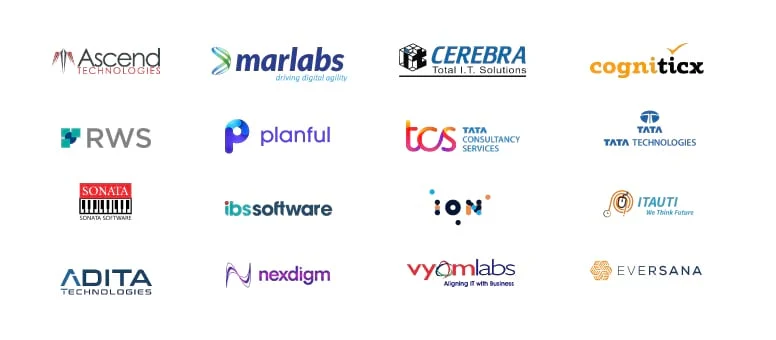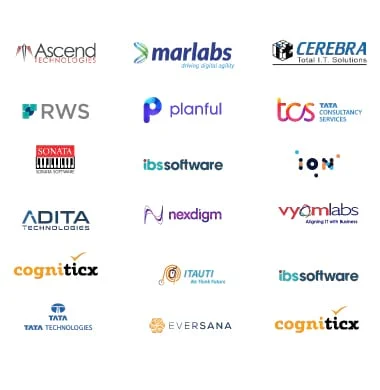30+ Hrs
Hands On Training
Lifetime Access
Updated Content
Customizable
Learning Paths
Industry Expert
Mentors
Projects
Advanced Interactive

Hands On Training
Updated Content
Learning Paths
Mentors
Advanced Interactive
Project Management Professional (PMP) is a credential offered by the Project Management Institute, U.S.A. It is a project management course recognised worldwide. PMBOK-Fifth edition is the new iteration of this exam. Certification is valid for three years.
HKR delivers the best industry-oriented PMP training course that is in line to clear the certification exams. Our course covers all the key concepts such as key fundamentals of PMP, PMP concepts, PM framework, PM process, project integration management, project scope, time, cost, quality and human resource management, etc. During the training period, you can get full support and real-time project assistance from experienced professionals. Enroll today at HKR for accepting the new challenges to make the best out of our PMP online training.
To apply for the PMP Training, you need to either:
The PMP training course curriculum is structured to streamline the learning process by a team of experts. You can find the complete course details in the below-mentioned modules.
1.1 What is PMP?
1.2 Prerequisites for the PMP Exam
1.3 PMP Exam Syllabus
1.4 Structure of the PMP Exam
2.1 Project Definition
2.2 Understanding Project Management
2.3 Understanding Operations Management
2.4 Understanding Program Management
2.5 Understanding Portfolio Management
2.6 Project Management Office (PMO)
2.7 Portfolio, Program, Project – A High-Level View
2.8 Mission, Vision, Goal, Strategy, Objective and Tactic
2.9 Organizational Strategy
2.10 Project’s Link with Organizational Strategy
2.11 Strategic Alignment of Projects
2.12 Business Benefits
2.13 Benefits Realization
2.14 Business Value
2.15 Constraints
2.16 Organizational Systems
2.17 Enterprise Environmental Factors
2.18 Organizational Process Assets
2.19 Comparing Project Life Cycle and Product Life Cycle
2.20 Project Manager Role
3.1 Overview of the Project Life Cycle
3.2 Comparing Project Life Cycle and Project Management process
3.3 Stakeholders
3.4 Key Stakeholders
3.5 Process Groups and Knowledge Areas
3.6 Inputs/outputs of the 49 Project Management processes
3.7 Organizational influences on Project Management
4.1 Understanding Project Integration Management
4.2 Project team role
4.3 Project sponsor role
4.4 Project selection methods
4.5 Project charter and role of a project manager in charter development
4.6 Recap of continuous improvement lessons
4.7 Project Integration Management Knowledge Area Processes
5.1 Understanding Project Scope Management
5.2 Comparing Product Scope and Project Scope
5.3 Project Scope Management Knowledge Area Processes
6.1 Understanding Project Schedule Management
6.2 Understanding Project Schedule
6.3 Gantt Charts
6.4 Network Diagram
6.5 Estimation
6.6 Schedule Network Analysis Techniques
6.7 PERT, PERT Analysis, Critical Path Method and Schedule Compression
6.8 Project Schedule Management Knowledge Area Processes
7.1 Understanding Project Cost Management
7.2 Distinguishing Cost Estimating and Cost Budgeting
7.3 Key Terminology in Project Cost Management
7.4 Earned Value Technique
7.5 Project Cost Management Knowledge Area Processes
8.1 Understanding Quality
8.2 Understanding Quality Management
8.3 Cost of Quality
8.4 Seven Basic Tools of Quality
8.5 Project Quality Management Knowledge Area Processes
9.1 Understanding Resource Management
9.2 Project Sponsor Roles and Responsibilities
9.3 Comparing Functional Manager and Project Manager
9.4 Conflict Management
9.5 Motivation Theory
9.6 Project Resource Management Knowledge Area Processes
10.1 Understanding Communication
10.2 Communication Methods, Technology, and Channels
10.3 Basic Communication Model
10.4 Key Terminology in Project Communication Management
10.5 Project Communication Management Knowledge Area Processes
11.1 Understanding the Risk
11.2 Project Management Risks
11.3 Calculating Risk and EMV
11.4 Risk Classification
11.5 Decision Tree Analysis
11.6 Risk Reserve and Contingency Reserve
11.7 Key Terminology in Project Risk Management
11.8 Project Risk Management Knowledge Area processes
12.1 Understanding a Contract
12.2 Different Types of Contracts
12.3 Pros and Cons of contract types
12.4 Key Terminology in Project Procurement Management
12.5 Project Procurement Management Knowledge Area Processes
13.1 Who is a Stakeholder?
13.2 Stakeholder Register
13.3 Various Analytical Techniques for Stakeholder Analysis
13.4 Managing stakeholder engagement and relationship
13.5 Key Terminology in Project Stakeholder Management
13.6 Project Stakeholder Management Knowledge Area Processes
14.1 PMI’s Code of Ethics and Professional Conduct
14.2 Vision and purpose of the Code
14.3 To whom does the Code apply?
14.4 Structure of the Code
14.5 Aspirational and Mandatory Conduct
14.6 Responsibility and Ethics Complaints
14.7 Description of Respect, Fairness, and Honesty
Description: The project aims to add skills and experience in managing end-to-end lifecycle. It involves stakeholder analysis, mee.....tings, task execution, risk management, leading a team, and many more. Read more
Description: It requires dealing with design teams, architects, suppliers, contractors, and other professionals. Also, it involves..... creating blueprints, budgeting, scheduling, executing, material planning, etc. Read more


PMP Training or Project Management Professional Training is the world's leading project management certification offered by PMI. It is a globally recognized certification in project management that builds the ability to professionally manage a business, people, and processes. Getting certified in PMP training will give you more opportunities to add value to the market. Moreover, you can grow your career as a Project Manager after getting all the PMP skills in real-time.
There are no specific prerequisites to take up this PMP course. Anyone who is interested in learning this course can opt for it.
To start with the PMP training course, you need to check with the best institute that delivers knowledge. Before proceeding to join any training, take suggestions from the experts who had already learned the course. We at HKR, with a team of industry experts, are ready to fulfill your dream career to achieve a job in desired companies.
Once you complete the entire course along with real-time projects and assignments, HKR delivers the course completion certification. This certification helps to get a job in any company very quickly.
Our trainers are highly qualified and certified with many years of industry experience with a technical background in PMP.
Certification differentiates you from the non-certified peers, and you can demand the best salary in the leading companies.
We, at HKR, provide complete guidance to reach your dream job. But your job will be based on your performance in the interview panel and the recruiter requirements.
The PMP exam fee is based on PMI members and non-PMI members. The PMP exam price for a PMI member is $405 while $555 for a non-PMI member.
It is required to have the below qualification and experience to hold the designation of a project management professional. Below are the requirements:
1. Get trained on PMP from a IT training provider
2. The next step Is to apply for the PMP certification exam
3. You will need to go to the PMI website and become a member by following the on-screen steps
4. You need to select the time slot, schedule and complete the certification exam with a good value
5. You will need to attain 60 PDUs in the timeframe of 3 years and report the same on the PMI website to continue and maintain the PMP certification
The PMP certification exam includes 200 multiple – choice questions with a time duration of 4 hours.
A program manager should hold the below set of skills to enhance his/her career in PMP.
a. Communication skills
b. Task management
c. Scheduling
d. Cost management
e. Leadership qualities
f. Quality management
g. Critical thinking capacity
h. Negotiation capabilities
i. Risk management functionalities
Yes, there is a possibility that the PMP certification could expire. The CCR book provided by PMI states that the certification will get suspended if the PDU (Professional development units) are not earned by the candidates to get qualified for recertification. In simple terms, the credentials will be valid only for one year. You will be able to see the status of your certification on the PMI website.
Yes, HKR Trainings offers free resources for learning PMP, this will help you gain an idea about PMP and its fundamentals.
Below is the list of the cities in which PMP training is offered.
1. Hyderabad
2. Chennai
3. Delhi
4. Bangalore
5. Mumbai
6. London
7. New York
8. Pune
If you fail to clear the PMP exam, you will have three attempts to complete the PMP exam within a timeframe of one year since the date you have applied. You will need to take a break for one year from the last examination date if you were not able to clear the exam within the eligible time period.
The average salary offered for an individual who is designated as a Project Management Professional is 17LPA in India while it is $108 USD in the United States.
Below are the set of various reasons on why the Project Manager certification is beneficial.
1. For salary improvements
2. To provide a platform which helps in attaining recognition
3. Enhance leadership qualities
4. Learn how to solve the problems
5. Improve skills in risk management
Below are the set of requirements which are needed to learn PMP.
1. A bachelor or 4 year degree is required
2. At Least 3 years of experience in project handling is required
3. Complete 35 hours of training and certification in Project Management
Or
1. Diploma or associate degree
2. 5 years of project leading experience
3. 35 hours of training In PMP and certification
MBA is considered as a broad based degree while PMP is a course which is designed to gain knowledge in a specific field like Project Management.
The PMP training course benefits the following list of professionals.
Project Management Professional certification is an added value for project managers at the industry level. PMP includes planning, budgeting, executing, project management tools, processes, and creating various reports regarding a project. A project manager looks after all these things within an entity. Moreover, PMP learning will give you the skills, experience, and knowledge to manage projects more effectively. Also, the PMP certification will boost your career by adding more feathers to your credentials.
Yes, we don’t assure 100% placement assistance. We are tied up with some corporate companies so when they have a requirement we send your profiles to them.
Yes, we provide demo before starting any training in which you can clear all your doubts before starting training.
Our trainers are real time experts who are presently working on particular platform on which they are providing training.
You can call our customer care 24/7
Max of the students get satisfied with our training, if you are not then we provide a specialised training in return.
Each and every class is recorded so if you missed any class you can review the recordings and clarify any doubts with the trainer in next class.
For Assistance Contact:
![]()
![]() +91 9711699759
+91 9711699759
Query